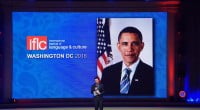Forum on the Future of Islam – Is Islamism(s) Prone to Produce Extremism?
Date posted: February 11, 2016
Rethink Institute has launched a new research program, Future of Islam, to debate and address the most critical questions, share ideas, and offer solutions to salient issues related to the future of Islam and Muslims. Forum on the Future of Islam has been established as the deliberative component of the program whereby prominent experts and leaders meet annually to discuss and deliberate specific themes. The first meeting of the Forum under the theme “Muslim Perspectives on Islamic Extremism”took place in Washington, DC, on December 5, 2015.
Since the end of the Cold War, unfortunately, Islam has become one of the top global concerns. Political, social, and sectarian fault lines in Muslim geographies continue to produce conflict and violence, affecting not only domestic but also regional and global power dynamics. In addition, in an age of fast, cursory, unfiltered information and a continuous news cycle, any misdeed committed by any Muslim anywhere, at any time, with any motive, is haphazardly attributed to Islam. It may not be far-fetched to argue that the future of Islam is also the future of Muslims. And given the magnitude of the issues surrounding this people and religion, the future of Islam will also determine the future of humanity at large.
The first meeting of the Forum considered:
- The challenge of extremism and radicalism in Muslim communities around the world;
- The failure of Islamism to address social, political, and economic issues;
- Identity crises and the social predicament of Muslim minorities in Western societies;
- Radicalization of Muslim youths;
- The conflict between modern values and institutions and the tenets of Islam as conceived by some Muslims and non-Muslims;
- Conflicts among state, civil, Sufi, and political manifestations of Islam;
- Coexistence of Muslim and non-Muslim communities.
Forum speakers included:
Asma Afsaruddin, Imad-ad-Dean Ahmad, Azizah al-Hibri, Mehdi Aminrazavi, Abdul Karim Bangura, Birol Baskan, Fevzi Bilgin, Mustafa Gurbuz, Shireen T. Hunter, Arsalan Iftikhar, Margaret A. Johnson, Ozgur Koca, Ahmet T. Kuru, Nadia Oweidat, Leila Piran, Zeki Saritoprak, Asma T. Uddin
Source: Rethink Institute , Jan 22, 2016
Tags: Islamic World | North America | USA |
























